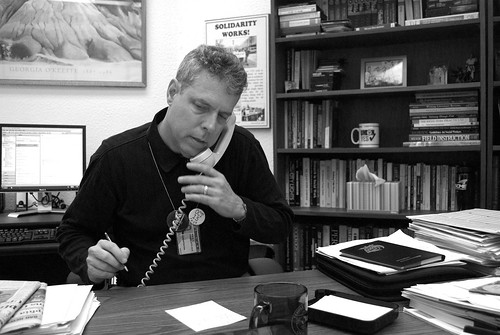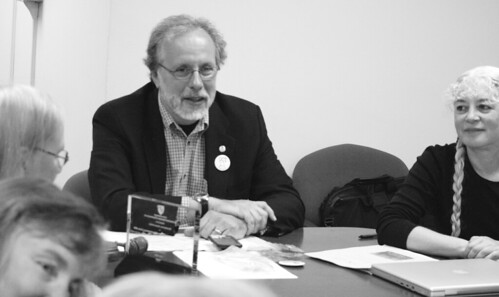Two of Temple’s large unions may have means to strike this semester.
The university’s American Federation of State, County and Municipal Employees and the Temple Association of University Professionals have attempted to come to a new contract agreement with the university to no avail for the last few months.
TAUP, which consists of 1,250 faculty members, had a contract which expired Oct. 15, 2008. AFSCME’s contract expired Oct. 31, 2007.
AFSCME met with members of the university once prior to winter break.

“They have not changed any of their positions,” said Paul Dannenfelser, president of AFSCME. “There is no progress. We’re disappointed that Temple didn’t have anything to offer us, and they didn’t seem interested at all in coming to a resolution. Now, there is also new information about the financial crisis, and we’re not sure what that means for us in terms of negotiations.”
The university placed a final offer on the table for AFSCME in May 2008. The offer included an increase that would take effect in November 2008.
“Since [November] came and went, we met again Dec. 18 to touch base,” said Sharon Boyle, a university negotiating team member. “There is still no movement, but we’ve said that we’re open to listening.”
“I’ve had a number of phone calls from my members who have been getting solicitation letters from Temple requesting a donation, and they are very upset that Temple’s asking them for money at a time when they haven’t had a raise in two years,” Dannenfelser said. “A lot of our members really feel Temple is exploiting the financial crisis.”
Dannenfelser said AFSCME’s action committee has been discussing future actions they might take.
“The people on the committee would like to act in a more organized way,” Dannenfelser said. “There’s a lot of anger building among people. They’re running out of patience. There’s going to be a lot more activity on campus this year. You’re going to see more action taken. A strike may be a possibility this year.”
On Dec. 5, 2008, TAUP gave management a revised offer and then met with officials in a meeting that didn’t make any progress, said Arthur Hochner, president of TAUP.
The negotiating teams met again on Jan. 7.
“They gave us a little speech about the economy and withdrew their economic proposal and said they would be willing to discuss other options with us,” Hochner said. “We were surprised. We asked them what options they wanted to discuss and they said, ‘We don’t know yet.’ We asked them what they did know and they said, ‘We don’t know that either.’ From our perspective, it was a strange way of negotiating because we were left in limbo.”
“We told them that the contract was subject to continuing economic circumstances,” said George Moore, another member of the university negotiating team. “We told them all along that we couldn’t guarantee keeping it on the table. When we got to January with all the news that had been transpiring over the past month, we determined that we could no longer in good faith keep that offer out on the table because of the strains it would put on the university.”
The university later sent TAUP an offer, but the two teams have not yet met to discuss it. They are scheduled to meet Jan. 21.
The previous economic offer made by the university guaranteed a roughly 3.75 percent per year increase for four years. The most recent offer is a five-year contract, guaranteeing 3 percent for the first fiscal year, retroactive to July 1, 2008 through the end of June 2009. There will be no increase the second year and a 2 percent increase each of the following three years.
This is consistent with the announcement made by President Ann Weaver Hart Jan. 15. There’s still the ability to give a salary increase to outstanding individual faculty members.
No other details on the most recent economic proposal are available until after the teams meet Wednesday.

“It doesn’t make sense that Temple can’t afford a halfway decent pay increase for faculty,” Hochner said. “We don’t think that’s true.”
Hochner said they have been talking to TAUP members about “what it will take to get a fair contract.” He said a strike is becoming a greater possibility, if the members agree to it.
TAUP is also planning more picketing and other similar activities in the coming weeks.
“They’re continuing all of their construction projects,” Hochner said. “It seems to me that Temple would much rather keep all of its projects going than give their faculty a fair pay increase. Reaching an agreement with us is not their priority. We want to have something that’s mutually agreeable and not just take whatever they’re offering.”
“We’re doing what other schools and colleges around the country are doing,” Moore said. “We have from the very beginning tried to be fair and reasonable and as generous as we could while being fair to our students. In our economy, we can’t make promises to just one part of the university.”
Several other colleges and universities have recently taken actions similar to that of Temple.
“We want to have a contract,” said Ray Betzner, assistant vice president of university communications. “We’ve wanted [a contract] since the spring. We’re ready.”
Kathryn A. López can be reached at kathryn.lopez@temple.edu.



AFSCME should meet with the Membership face-to-face at location on MAIN CAMPUS, so that all members maybe in attendance. It’s definitely time.